Economic and Financial Management: Tesco PLC Business Analysis Report
VerifiedAdded on 2020/12/29
|10
|1870
|160
Report
AI Summary
This report provides a comprehensive analysis of the economic and financial management of Tesco PLC. It begins with an introduction to economic and financial management, defining its role in planning, controlling, and directing financial activities. The main body of the report evaluates the impact of the economy on the business environment, including factors such as inflation, interest rates, trade cycles, demand and supply, income and employment, and the role of money and banking. The report then applies various economic theories, such as classical economic theory, laissez-faire capitalism, and the efficient market hypothesis, to the organizational context of Tesco. Furthermore, it analyzes the macro and microeconomic forces affecting the business, utilizing a PESTEL analysis to examine political, economic, social, technological, environmental, and legal factors. A SWOT analysis is also conducted to assess Tesco's strengths, weaknesses, opportunities, and threats. The report concludes by emphasizing the importance of considering all aspects of the business environment to ensure survival, gain a competitive advantage, and increase profitability, referencing various academic sources.
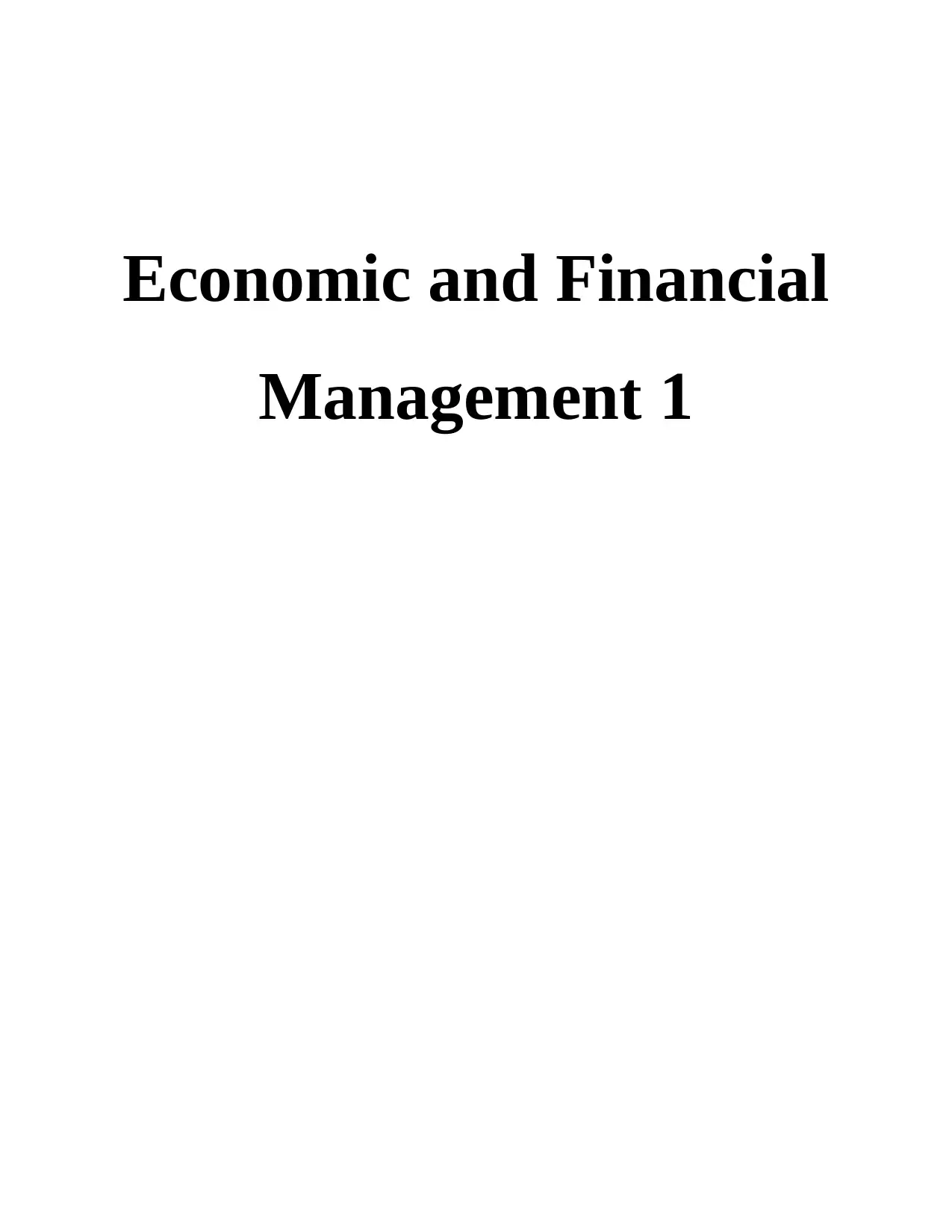
Economic and Financial
Management 1
Management 1
Paraphrase This Document
Need a fresh take? Get an instant paraphrase of this document with our AI Paraphraser
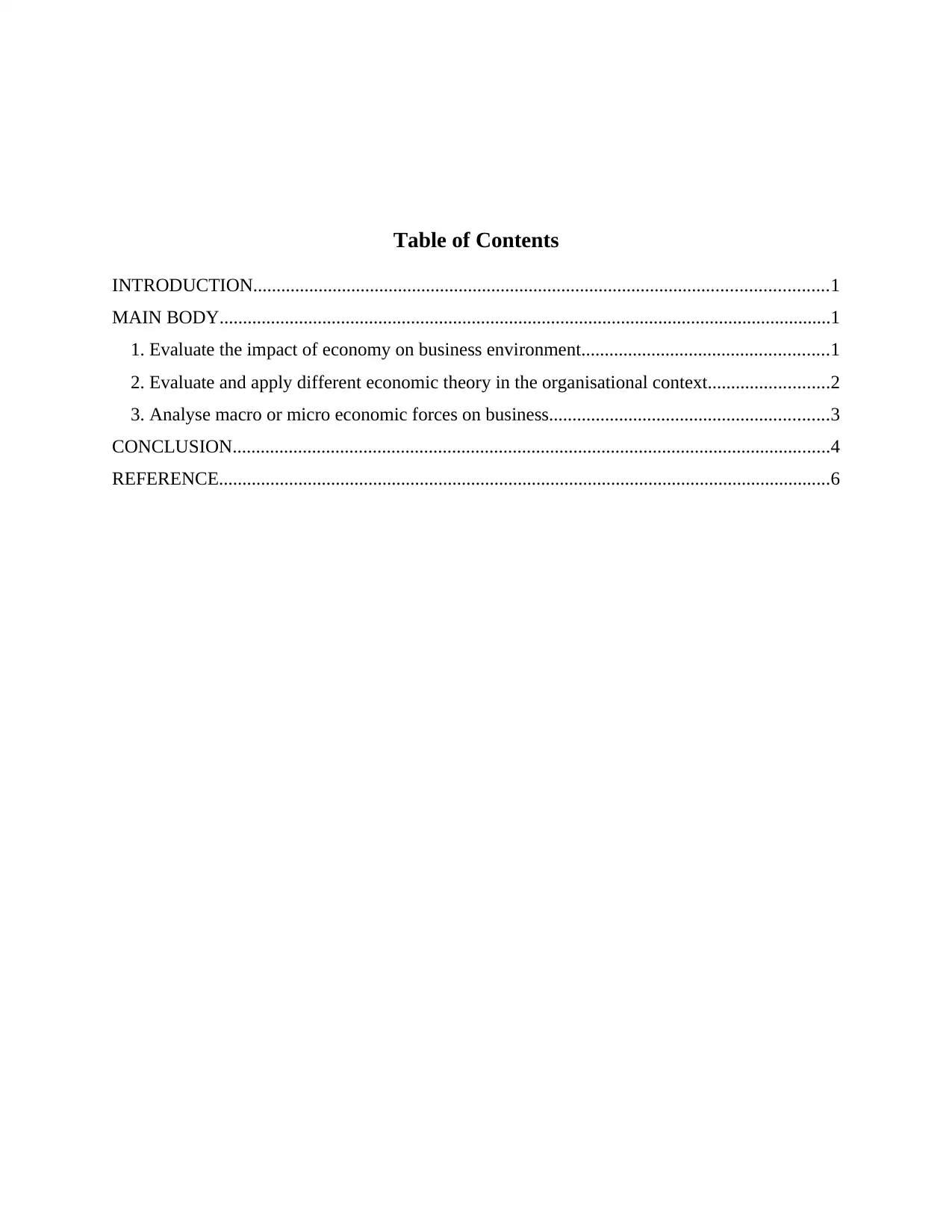
Table of Contents
INTRODUCTION...........................................................................................................................1
MAIN BODY...................................................................................................................................1
1. Evaluate the impact of economy on business environment.....................................................1
2. Evaluate and apply different economic theory in the organisational context..........................2
3. Analyse macro or micro economic forces on business............................................................3
CONCLUSION................................................................................................................................4
REFERENCE...................................................................................................................................6
INTRODUCTION...........................................................................................................................1
MAIN BODY...................................................................................................................................1
1. Evaluate the impact of economy on business environment.....................................................1
2. Evaluate and apply different economic theory in the organisational context..........................2
3. Analyse macro or micro economic forces on business............................................................3
CONCLUSION................................................................................................................................4
REFERENCE...................................................................................................................................6

⊘ This is a preview!⊘
Do you want full access?
Subscribe today to unlock all pages.

Trusted by 1+ million students worldwide
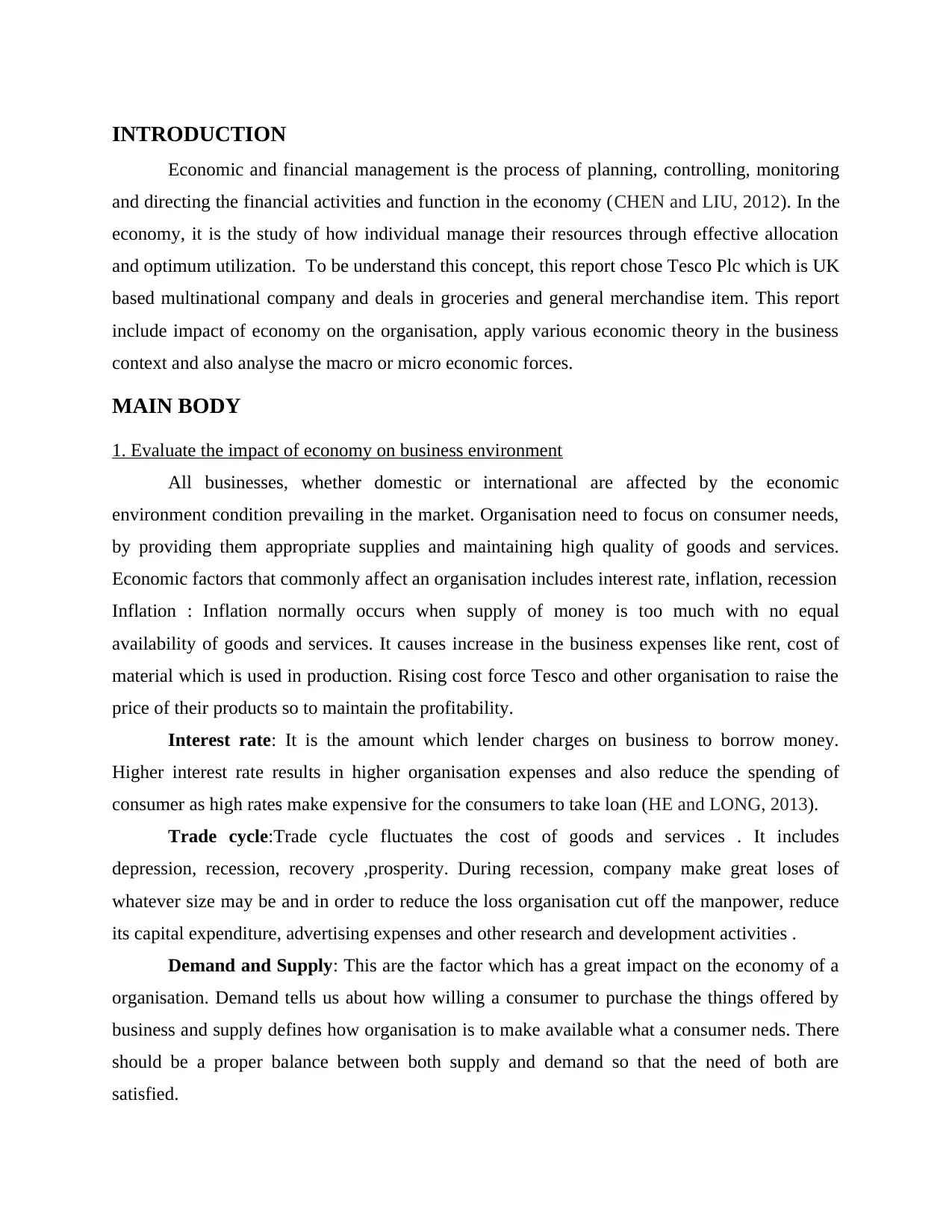
INTRODUCTION
Economic and financial management is the process of planning, controlling, monitoring
and directing the financial activities and function in the economy (CHEN and LIU, 2012). In the
economy, it is the study of how individual manage their resources through effective allocation
and optimum utilization. To be understand this concept, this report chose Tesco Plc which is UK
based multinational company and deals in groceries and general merchandise item. This report
include impact of economy on the organisation, apply various economic theory in the business
context and also analyse the macro or micro economic forces.
MAIN BODY
1. Evaluate the impact of economy on business environment
All businesses, whether domestic or international are affected by the economic
environment condition prevailing in the market. Organisation need to focus on consumer needs,
by providing them appropriate supplies and maintaining high quality of goods and services.
Economic factors that commonly affect an organisation includes interest rate, inflation, recession
Inflation : Inflation normally occurs when supply of money is too much with no equal
availability of goods and services. It causes increase in the business expenses like rent, cost of
material which is used in production. Rising cost force Tesco and other organisation to raise the
price of their products so to maintain the profitability.
Interest rate: It is the amount which lender charges on business to borrow money.
Higher interest rate results in higher organisation expenses and also reduce the spending of
consumer as high rates make expensive for the consumers to take loan (HE and LONG, 2013).
Trade cycle:Trade cycle fluctuates the cost of goods and services . It includes
depression, recession, recovery ,prosperity. During recession, company make great loses of
whatever size may be and in order to reduce the loss organisation cut off the manpower, reduce
its capital expenditure, advertising expenses and other research and development activities .
Demand and Supply: This are the factor which has a great impact on the economy of a
organisation. Demand tells us about how willing a consumer to purchase the things offered by
business and supply defines how organisation is to make available what a consumer neds. There
should be a proper balance between both supply and demand so that the need of both are
satisfied.
Economic and financial management is the process of planning, controlling, monitoring
and directing the financial activities and function in the economy (CHEN and LIU, 2012). In the
economy, it is the study of how individual manage their resources through effective allocation
and optimum utilization. To be understand this concept, this report chose Tesco Plc which is UK
based multinational company and deals in groceries and general merchandise item. This report
include impact of economy on the organisation, apply various economic theory in the business
context and also analyse the macro or micro economic forces.
MAIN BODY
1. Evaluate the impact of economy on business environment
All businesses, whether domestic or international are affected by the economic
environment condition prevailing in the market. Organisation need to focus on consumer needs,
by providing them appropriate supplies and maintaining high quality of goods and services.
Economic factors that commonly affect an organisation includes interest rate, inflation, recession
Inflation : Inflation normally occurs when supply of money is too much with no equal
availability of goods and services. It causes increase in the business expenses like rent, cost of
material which is used in production. Rising cost force Tesco and other organisation to raise the
price of their products so to maintain the profitability.
Interest rate: It is the amount which lender charges on business to borrow money.
Higher interest rate results in higher organisation expenses and also reduce the spending of
consumer as high rates make expensive for the consumers to take loan (HE and LONG, 2013).
Trade cycle:Trade cycle fluctuates the cost of goods and services . It includes
depression, recession, recovery ,prosperity. During recession, company make great loses of
whatever size may be and in order to reduce the loss organisation cut off the manpower, reduce
its capital expenditure, advertising expenses and other research and development activities .
Demand and Supply: This are the factor which has a great impact on the economy of a
organisation. Demand tells us about how willing a consumer to purchase the things offered by
business and supply defines how organisation is to make available what a consumer neds. There
should be a proper balance between both supply and demand so that the need of both are
satisfied.
Paraphrase This Document
Need a fresh take? Get an instant paraphrase of this document with our AI Paraphraser
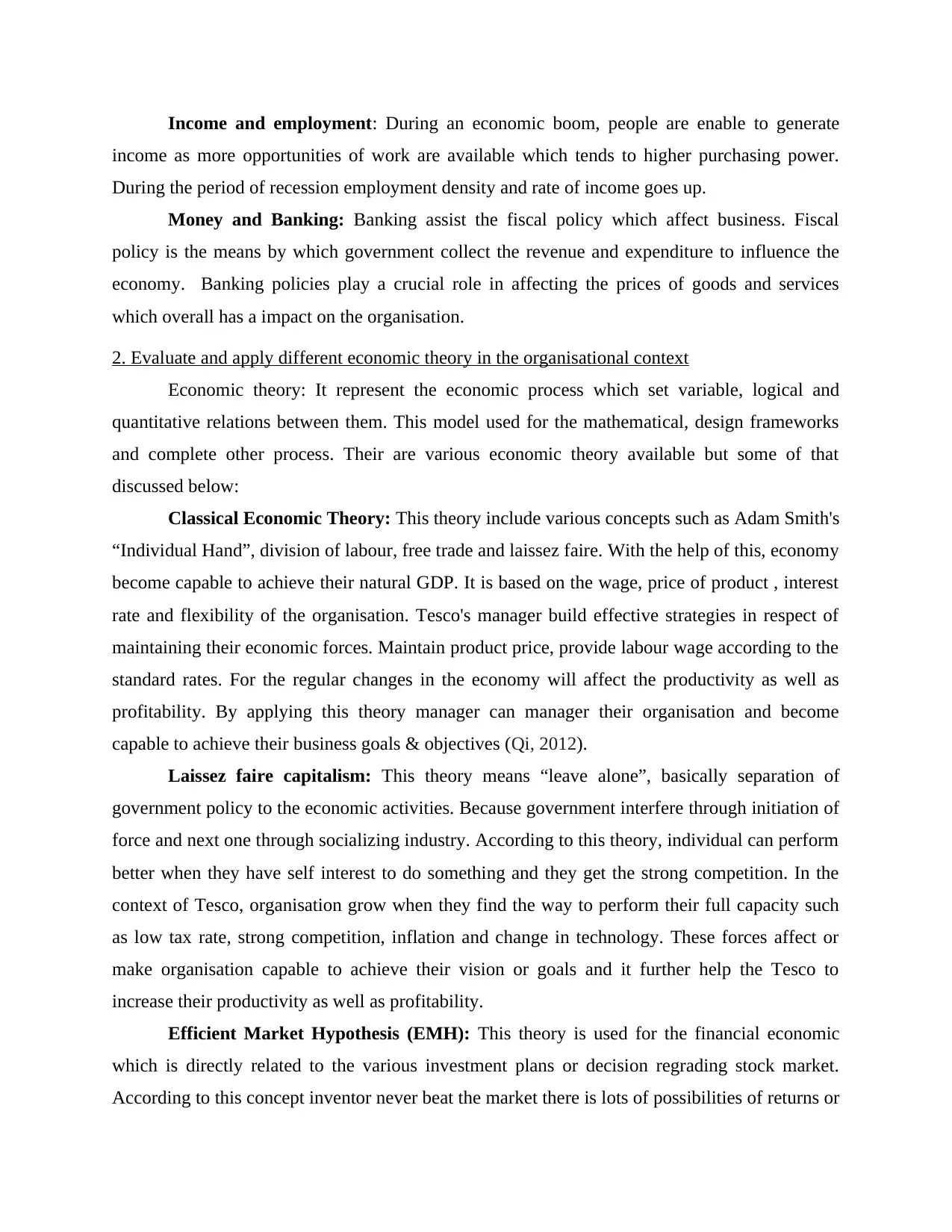
Income and employment: During an economic boom, people are enable to generate
income as more opportunities of work are available which tends to higher purchasing power.
During the period of recession employment density and rate of income goes up.
Money and Banking: Banking assist the fiscal policy which affect business. Fiscal
policy is the means by which government collect the revenue and expenditure to influence the
economy. Banking policies play a crucial role in affecting the prices of goods and services
which overall has a impact on the organisation.
2. Evaluate and apply different economic theory in the organisational context
Economic theory: It represent the economic process which set variable, logical and
quantitative relations between them. This model used for the mathematical, design frameworks
and complete other process. Their are various economic theory available but some of that
discussed below:
Classical Economic Theory: This theory include various concepts such as Adam Smith's
“Individual Hand”, division of labour, free trade and laissez faire. With the help of this, economy
become capable to achieve their natural GDP. It is based on the wage, price of product , interest
rate and flexibility of the organisation. Tesco's manager build effective strategies in respect of
maintaining their economic forces. Maintain product price, provide labour wage according to the
standard rates. For the regular changes in the economy will affect the productivity as well as
profitability. By applying this theory manager can manager their organisation and become
capable to achieve their business goals & objectives (Qi, 2012).
Laissez faire capitalism: This theory means “leave alone”, basically separation of
government policy to the economic activities. Because government interfere through initiation of
force and next one through socializing industry. According to this theory, individual can perform
better when they have self interest to do something and they get the strong competition. In the
context of Tesco, organisation grow when they find the way to perform their full capacity such
as low tax rate, strong competition, inflation and change in technology. These forces affect or
make organisation capable to achieve their vision or goals and it further help the Tesco to
increase their productivity as well as profitability.
Efficient Market Hypothesis (EMH): This theory is used for the financial economic
which is directly related to the various investment plans or decision regrading stock market.
According to this concept inventor never beat the market there is lots of possibilities of returns or
income as more opportunities of work are available which tends to higher purchasing power.
During the period of recession employment density and rate of income goes up.
Money and Banking: Banking assist the fiscal policy which affect business. Fiscal
policy is the means by which government collect the revenue and expenditure to influence the
economy. Banking policies play a crucial role in affecting the prices of goods and services
which overall has a impact on the organisation.
2. Evaluate and apply different economic theory in the organisational context
Economic theory: It represent the economic process which set variable, logical and
quantitative relations between them. This model used for the mathematical, design frameworks
and complete other process. Their are various economic theory available but some of that
discussed below:
Classical Economic Theory: This theory include various concepts such as Adam Smith's
“Individual Hand”, division of labour, free trade and laissez faire. With the help of this, economy
become capable to achieve their natural GDP. It is based on the wage, price of product , interest
rate and flexibility of the organisation. Tesco's manager build effective strategies in respect of
maintaining their economic forces. Maintain product price, provide labour wage according to the
standard rates. For the regular changes in the economy will affect the productivity as well as
profitability. By applying this theory manager can manager their organisation and become
capable to achieve their business goals & objectives (Qi, 2012).
Laissez faire capitalism: This theory means “leave alone”, basically separation of
government policy to the economic activities. Because government interfere through initiation of
force and next one through socializing industry. According to this theory, individual can perform
better when they have self interest to do something and they get the strong competition. In the
context of Tesco, organisation grow when they find the way to perform their full capacity such
as low tax rate, strong competition, inflation and change in technology. These forces affect or
make organisation capable to achieve their vision or goals and it further help the Tesco to
increase their productivity as well as profitability.
Efficient Market Hypothesis (EMH): This theory is used for the financial economic
which is directly related to the various investment plans or decision regrading stock market.
According to this concept inventor never beat the market there is lots of possibilities of returns or
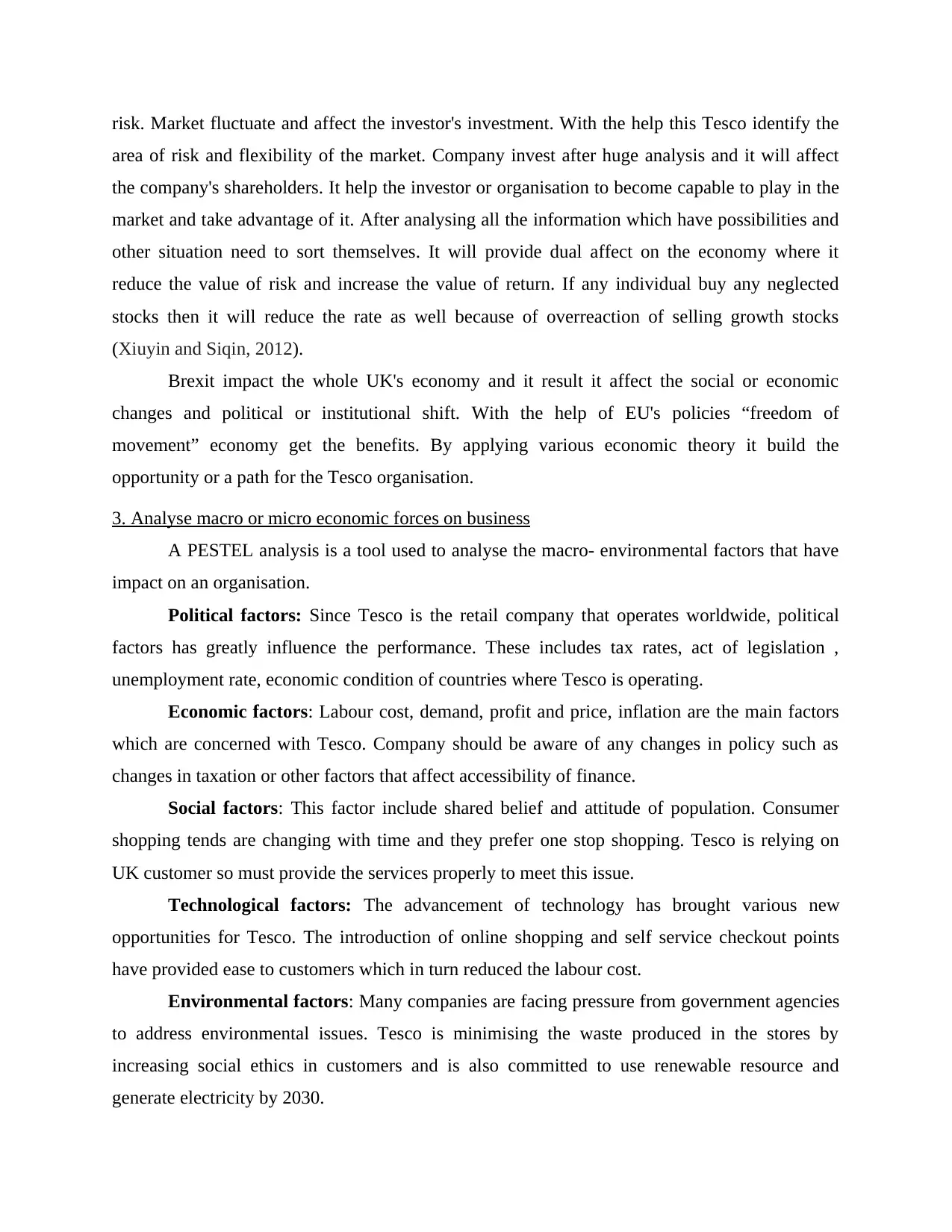
risk. Market fluctuate and affect the investor's investment. With the help this Tesco identify the
area of risk and flexibility of the market. Company invest after huge analysis and it will affect
the company's shareholders. It help the investor or organisation to become capable to play in the
market and take advantage of it. After analysing all the information which have possibilities and
other situation need to sort themselves. It will provide dual affect on the economy where it
reduce the value of risk and increase the value of return. If any individual buy any neglected
stocks then it will reduce the rate as well because of overreaction of selling growth stocks
(Xiuyin and Siqin, 2012).
Brexit impact the whole UK's economy and it result it affect the social or economic
changes and political or institutional shift. With the help of EU's policies “freedom of
movement” economy get the benefits. By applying various economic theory it build the
opportunity or a path for the Tesco organisation.
3. Analyse macro or micro economic forces on business
A PESTEL analysis is a tool used to analyse the macro- environmental factors that have
impact on an organisation.
Political factors: Since Tesco is the retail company that operates worldwide, political
factors has greatly influence the performance. These includes tax rates, act of legislation ,
unemployment rate, economic condition of countries where Tesco is operating.
Economic factors: Labour cost, demand, profit and price, inflation are the main factors
which are concerned with Tesco. Company should be aware of any changes in policy such as
changes in taxation or other factors that affect accessibility of finance.
Social factors: This factor include shared belief and attitude of population. Consumer
shopping tends are changing with time and they prefer one stop shopping. Tesco is relying on
UK customer so must provide the services properly to meet this issue.
Technological factors: The advancement of technology has brought various new
opportunities for Tesco. The introduction of online shopping and self service checkout points
have provided ease to customers which in turn reduced the labour cost.
Environmental factors: Many companies are facing pressure from government agencies
to address environmental issues. Tesco is minimising the waste produced in the stores by
increasing social ethics in customers and is also committed to use renewable resource and
generate electricity by 2030.
area of risk and flexibility of the market. Company invest after huge analysis and it will affect
the company's shareholders. It help the investor or organisation to become capable to play in the
market and take advantage of it. After analysing all the information which have possibilities and
other situation need to sort themselves. It will provide dual affect on the economy where it
reduce the value of risk and increase the value of return. If any individual buy any neglected
stocks then it will reduce the rate as well because of overreaction of selling growth stocks
(Xiuyin and Siqin, 2012).
Brexit impact the whole UK's economy and it result it affect the social or economic
changes and political or institutional shift. With the help of EU's policies “freedom of
movement” economy get the benefits. By applying various economic theory it build the
opportunity or a path for the Tesco organisation.
3. Analyse macro or micro economic forces on business
A PESTEL analysis is a tool used to analyse the macro- environmental factors that have
impact on an organisation.
Political factors: Since Tesco is the retail company that operates worldwide, political
factors has greatly influence the performance. These includes tax rates, act of legislation ,
unemployment rate, economic condition of countries where Tesco is operating.
Economic factors: Labour cost, demand, profit and price, inflation are the main factors
which are concerned with Tesco. Company should be aware of any changes in policy such as
changes in taxation or other factors that affect accessibility of finance.
Social factors: This factor include shared belief and attitude of population. Consumer
shopping tends are changing with time and they prefer one stop shopping. Tesco is relying on
UK customer so must provide the services properly to meet this issue.
Technological factors: The advancement of technology has brought various new
opportunities for Tesco. The introduction of online shopping and self service checkout points
have provided ease to customers which in turn reduced the labour cost.
Environmental factors: Many companies are facing pressure from government agencies
to address environmental issues. Tesco is minimising the waste produced in the stores by
increasing social ethics in customers and is also committed to use renewable resource and
generate electricity by 2030.
⊘ This is a preview!⊘
Do you want full access?
Subscribe today to unlock all pages.

Trusted by 1+ million students worldwide
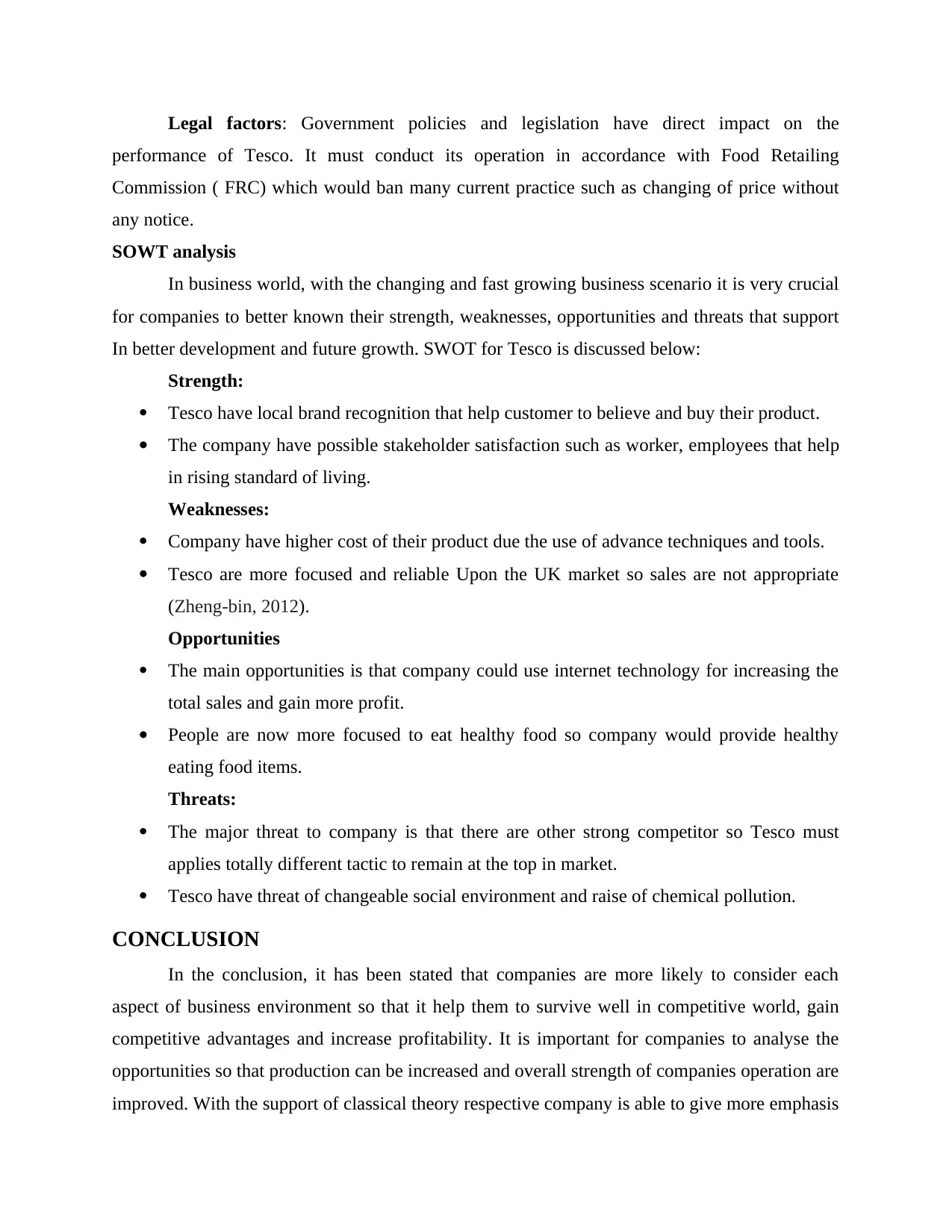
Legal factors: Government policies and legislation have direct impact on the
performance of Tesco. It must conduct its operation in accordance with Food Retailing
Commission ( FRC) which would ban many current practice such as changing of price without
any notice.
SOWT analysis
In business world, with the changing and fast growing business scenario it is very crucial
for companies to better known their strength, weaknesses, opportunities and threats that support
In better development and future growth. SWOT for Tesco is discussed below:
Strength:
Tesco have local brand recognition that help customer to believe and buy their product.
The company have possible stakeholder satisfaction such as worker, employees that help
in rising standard of living.
Weaknesses:
Company have higher cost of their product due the use of advance techniques and tools.
Tesco are more focused and reliable Upon the UK market so sales are not appropriate
(Zheng-bin, 2012).
Opportunities
The main opportunities is that company could use internet technology for increasing the
total sales and gain more profit.
People are now more focused to eat healthy food so company would provide healthy
eating food items.
Threats:
The major threat to company is that there are other strong competitor so Tesco must
applies totally different tactic to remain at the top in market.
Tesco have threat of changeable social environment and raise of chemical pollution.
CONCLUSION
In the conclusion, it has been stated that companies are more likely to consider each
aspect of business environment so that it help them to survive well in competitive world, gain
competitive advantages and increase profitability. It is important for companies to analyse the
opportunities so that production can be increased and overall strength of companies operation are
improved. With the support of classical theory respective company is able to give more emphasis
performance of Tesco. It must conduct its operation in accordance with Food Retailing
Commission ( FRC) which would ban many current practice such as changing of price without
any notice.
SOWT analysis
In business world, with the changing and fast growing business scenario it is very crucial
for companies to better known their strength, weaknesses, opportunities and threats that support
In better development and future growth. SWOT for Tesco is discussed below:
Strength:
Tesco have local brand recognition that help customer to believe and buy their product.
The company have possible stakeholder satisfaction such as worker, employees that help
in rising standard of living.
Weaknesses:
Company have higher cost of their product due the use of advance techniques and tools.
Tesco are more focused and reliable Upon the UK market so sales are not appropriate
(Zheng-bin, 2012).
Opportunities
The main opportunities is that company could use internet technology for increasing the
total sales and gain more profit.
People are now more focused to eat healthy food so company would provide healthy
eating food items.
Threats:
The major threat to company is that there are other strong competitor so Tesco must
applies totally different tactic to remain at the top in market.
Tesco have threat of changeable social environment and raise of chemical pollution.
CONCLUSION
In the conclusion, it has been stated that companies are more likely to consider each
aspect of business environment so that it help them to survive well in competitive world, gain
competitive advantages and increase profitability. It is important for companies to analyse the
opportunities so that production can be increased and overall strength of companies operation are
improved. With the support of classical theory respective company is able to give more emphasis
Paraphrase This Document
Need a fresh take? Get an instant paraphrase of this document with our AI Paraphraser
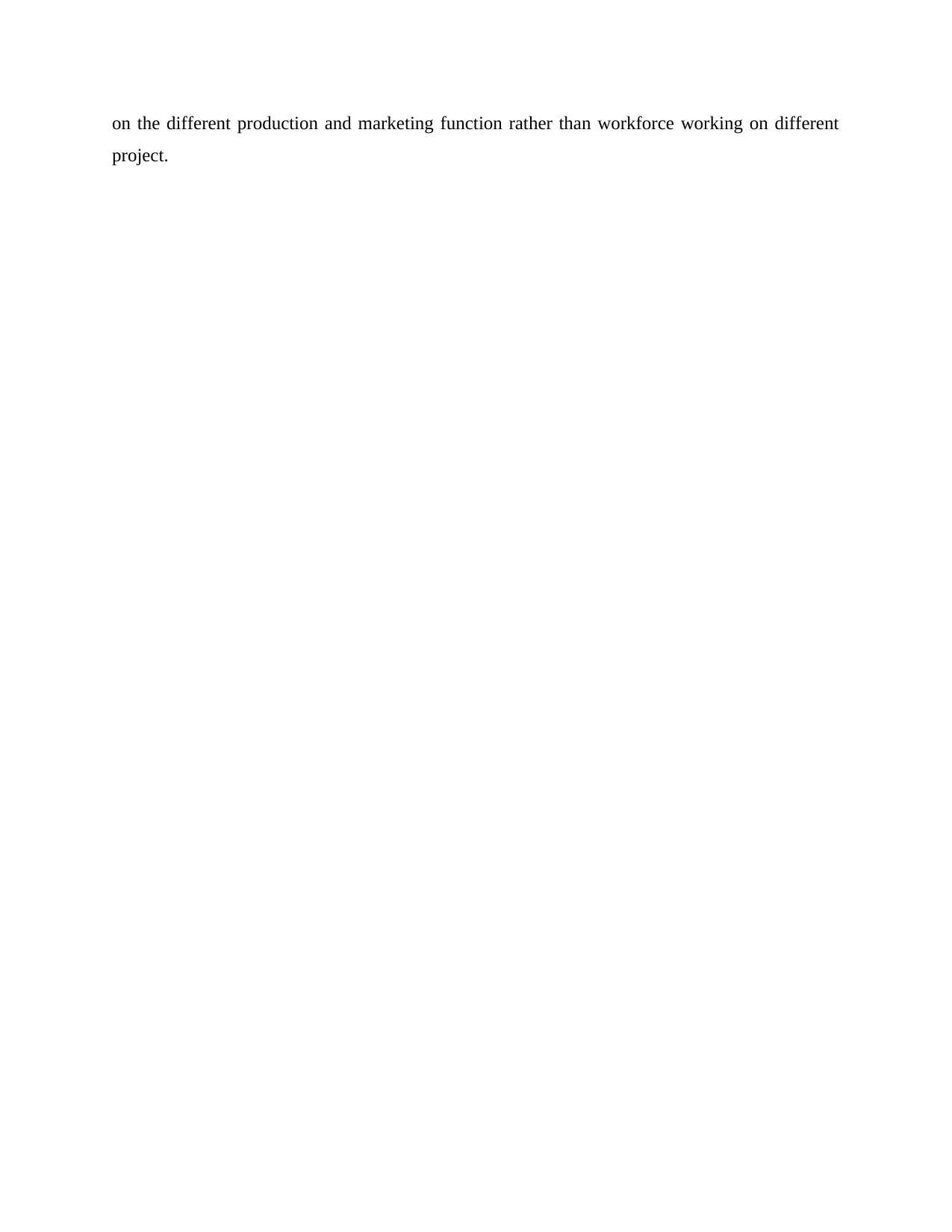
on the different production and marketing function rather than workforce working on different
project.
project.
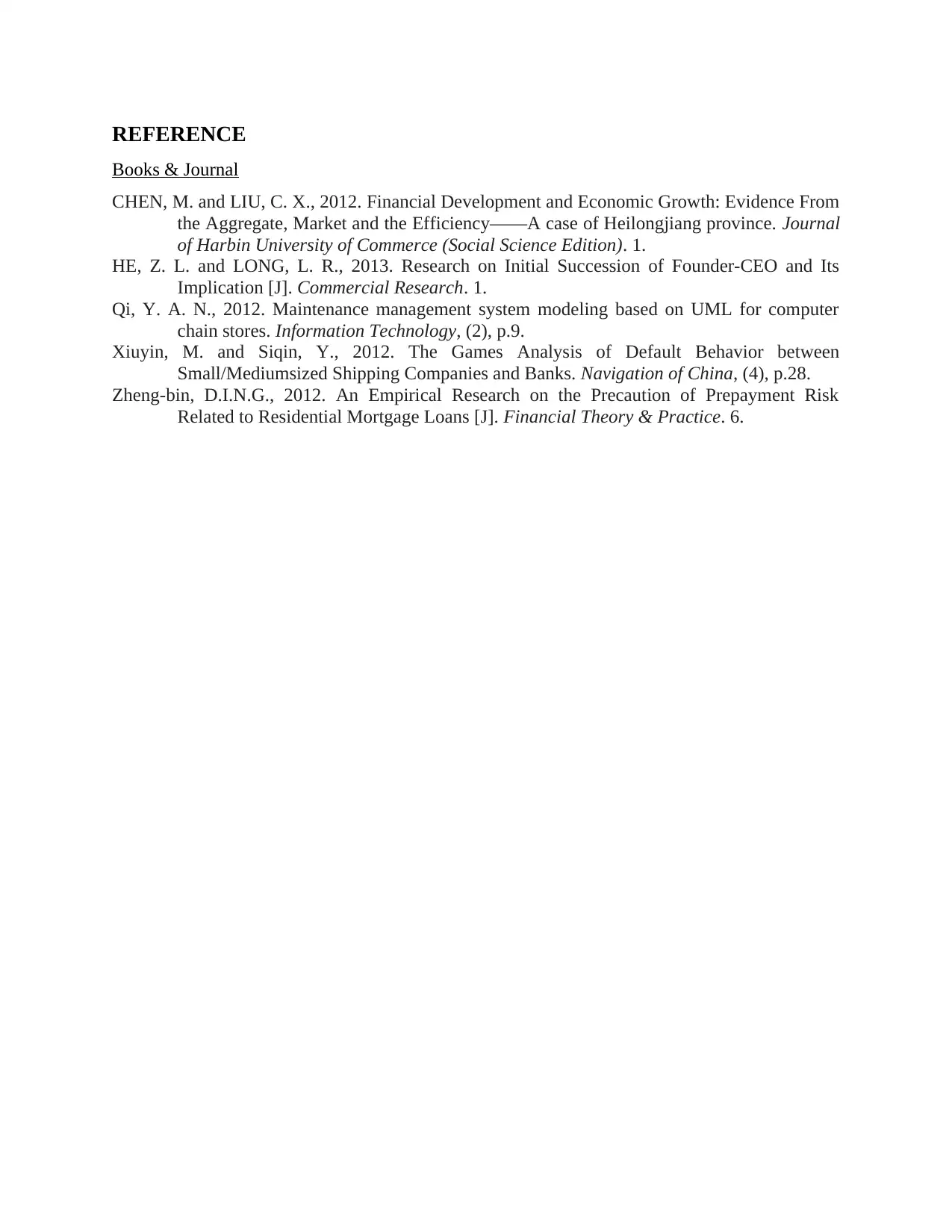
REFERENCE
Books & Journal
CHEN, M. and LIU, C. X., 2012. Financial Development and Economic Growth: Evidence From
the Aggregate, Market and the Efficiency——A case of Heilongjiang province. Journal
of Harbin University of Commerce (Social Science Edition). 1.
HE, Z. L. and LONG, L. R., 2013. Research on Initial Succession of Founder-CEO and Its
Implication [J]. Commercial Research. 1.
Qi, Y. A. N., 2012. Maintenance management system modeling based on UML for computer
chain stores. Information Technology, (2), p.9.
Xiuyin, M. and Siqin, Y., 2012. The Games Analysis of Default Behavior between
Small/Mediumsized Shipping Companies and Banks. Navigation of China, (4), p.28.
Zheng-bin, D.I.N.G., 2012. An Empirical Research on the Precaution of Prepayment Risk
Related to Residential Mortgage Loans [J]. Financial Theory & Practice. 6.
Books & Journal
CHEN, M. and LIU, C. X., 2012. Financial Development and Economic Growth: Evidence From
the Aggregate, Market and the Efficiency——A case of Heilongjiang province. Journal
of Harbin University of Commerce (Social Science Edition). 1.
HE, Z. L. and LONG, L. R., 2013. Research on Initial Succession of Founder-CEO and Its
Implication [J]. Commercial Research. 1.
Qi, Y. A. N., 2012. Maintenance management system modeling based on UML for computer
chain stores. Information Technology, (2), p.9.
Xiuyin, M. and Siqin, Y., 2012. The Games Analysis of Default Behavior between
Small/Mediumsized Shipping Companies and Banks. Navigation of China, (4), p.28.
Zheng-bin, D.I.N.G., 2012. An Empirical Research on the Precaution of Prepayment Risk
Related to Residential Mortgage Loans [J]. Financial Theory & Practice. 6.
⊘ This is a preview!⊘
Do you want full access?
Subscribe today to unlock all pages.

Trusted by 1+ million students worldwide

1 out of 10
Related Documents
Your All-in-One AI-Powered Toolkit for Academic Success.
+13062052269
info@desklib.com
Available 24*7 on WhatsApp / Email
![[object Object]](/_next/static/media/star-bottom.7253800d.svg)
Unlock your academic potential
Copyright © 2020–2026 A2Z Services. All Rights Reserved. Developed and managed by ZUCOL.





